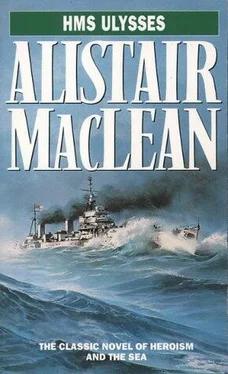"Don't send me away, sir," Ralston pleaded quietly. "I know it sounds, well, it sounds corny, self-pitying, but the truth is I've nowhere to go. I belong here, on the Ulysses. I can do things all the tune, I'm busy-working, sleeping, I don't have to talk about things, I can do things..." The self-possession was only the thinnest veneer, taut and frangible, with the quiet desperation immediately below.
"I can get a chance to help pay 'em back," Ralston hurried on. "Like crimping these fuses today-it-well, it was a privilege. It was more than that-it was-oh, I don't know. I can't find the words, sir."
Vallery knew. He felt sad, tired, defenceless. What could he offer this boy in place of this hate, this very human, consuming flame of revenge?
Nothing, he knew, nothing that Ralston wouldn't despise, wouldn't laugh at. This was not the time for pious platitudes. He sighed again, more heavily this time.
"Of course you shall remain, Ralston. Go down to the Police Office and tell them to tear up your warrant. If I can be of any help to you at any time-----"
"I understand, sir. Thank you very much. Good night, sir."
"Good night, my boy."
The door closed softly behind him.
CHAPTER TWO
MONDAY MORNING
"CLOSE ALL water-tight doors and scuttles. Hands to stations for leaving harbour." Impersonally, inexorably, the metallic voice of the broadcast system reached into every farthest corner of the ship.
And from every corner of the ship men came in answer to the call. They were cold men, shivering involuntarily in the icy north wind, sweating pungently as the heavy falling snow drifted under collars and cuffs, as numbed hands stuck to frozen ropes and metal. They were tired men, for fuelling, provisioning and ammunitioning had gone on far into the middle watch: few had had more than three hours' sleep.
And they were still angry, hostile men. Orders were obeyed, to be sure, with the mechanical efficiency of a highly trained ship's company; but obedience was surly, acquiescence resentful, and insolence lay ever close beneath the surface. But Divisional Officers and N.C.O.s handled the men with velvet gloves: Vallery had been emphatic about that.
Illogically enough, the highest pitch of resentment had not been caused by the Cumberland's prudent withdrawal. It had been produced the previous evening by the routine broadcast. "Mail will close at 2000 tonight." Mail! Those who weren't working non-stop round the clock were sleeping like the dead with neither the heart nor the will even to think of writing. Leading Seaman Doyle, the doyen of 'B' mess-deck and a venerable three-badger (thirteen years' undiscovered crime, as he modestly explained his good-conduct stripes) had summed up the matter succinctly: "If my old Missus was Helen of Troy and Jane Russell rolled into one, and all you blokes wot have seen the old dear's photo know that the very idea's a shocking libel on either of them ladies, I still wouldn't send her even a bleedin' postcard. You gotta draw a line somewhere. Me, for my scratcher." Whereupon he had dragged his hammock from the rack, slung it with millimetric accuracy beneath a hot-air louvre, seniority carries its privileges, and was asleep in two minutes. To a man, the port watch did likewise: the mail bag had gone ashore almost empty...
At 0600, exactly to the minute, the Ulysses slipped her moorings and steamed slowly towards the boom. In the grey half-light, under leaden, lowering clouds, she slid across the anchorage like an insubstantial ghost, more often than not half-hidden from view under sudden, heavy flurries of snow.
Even in the relatively clear spells, she was difficult to locate. She lacked solidity, substance, definition of outline. She had a curious air of impennanence, of volatility. An illusion, of course, but an illusion that accorded well with a legend, for a legend the Ulysses had become in her own brief lifetime. She was known and cherished by merchant seamen, by the men who sailed the bitter seas of the North, from St.
John's to Archangel, from the Shetlands to Jan Mayen, from Greenland to far reaches of Spitsbergen, remote on the edge of the world. Where there was danger, where there was death, there you might look to find the Ulysses, materialising wraith-like from a fog-bank, or just miraculously, being there when the bleak twilight of an Arctic dawn brought with it only the threat, at times almost the certainty, of never seeing the next.
A ghost-ship, almost, a legend. The Ulysses was also a young ship, but she had grown old in the Russian Convoys H.U.33B and on the Arctic patrols. She had been there from the beginning, and had known no other life. At first she had operated alone, escorting single ships or groups of two or three: later, she had operated with corvettes and frigates, and now she never moved without her squadron, the 14th Escort Carrier group.
But the Ulysses had never really sailed alone. Death had been, still was, her constant companion. He laid his ringer on a tanker, and there was the erupting hell of a high-octane detonation; on a cargo liner, and she went to the bottom with her load of war supplies, her back broken by a German torpedo; on a destroyer, and she knifed her way into the grey-black depths of the Barents Sea, her still racing engines her own executioners; on a U-boat, and she surfaced violently to be destroyed by gunfire, or slid down gently to the bottom of the sea, the dazed, shocked crew hoping for a cracked pressure hull and merciful instant extinction, dreading the endless gasping agony of suffocation in their iron tomb on the ocean floor. Where the Ulysses went, there also went death. But death never touched her. She was a lucky ship. A lucky ship and a ghost ship and the Arctic was her home.
Illusion, of course, this ghostliness, but a calculated illusion. The Ulysses was designed specifically for one task, for one ocean, and the camouflage experts had done a marvellous job. The special Arctic camouflage, the broken, slanting diagonals of grey and white and washed out blues merged beautifully, imperceptibly into the infinite shades of grey and white, the cold, bleak grimness of the barren northern seas.
And the camouflage was only the outward, the superficial indication of her fitness for the north.
Technically, the Ulysses was a light cruiser. She was the only one of her kind, a 5,500 ton modification of the famous Dido type, a forerunner of the Black Prince class. Five hundred and ten feet long, narrow in her fifty-foot beam with a raked stem, square cruiser stern and long fo'c'sle deck extending well abaft the bridge, a distance of over two hundred feet, she looked and was a lean, fast and compact warship, dangerous and durable.
"Locate: engage: destroy." These are the classic requirements of a naval ship in wartime, and to do each, and to do it with maximum speed and efficiency, the Ulysses was superbly equipped.
Location, for instance. The human element, of course, was indispensable, and Vallery was far too experienced and battlewise a captain to underestimate the value of the unceasing vigil of look-outs and signalmen. The human eye was not subject to blackouts, technical hitches or mechanical breakdowns. Radio reports, too, had their place and Asdic, of course, was the only defence against submarines.
But the Ulysses's greatest strength in location lay elsewhere. She was the first completely equipped radar ship in the world. Night and day, the radar scanners atop the fore and main tripod masts swept ceaselessly in a 360ø arc, combing the far horizons, searching, searching. Below, in the radar rooms, eight in all, and in the Fighter Direction rooms, trained eyes, alive to the slightest abnormality, never left the glowing screens. The radar's efficiency and range were alike fantastic. The makers, optimistically, as they had thought, had claimed a 40-45 mile operating range for their equipment. On the Ulysses's first trials after her refit for its installation, the radar had located a Condor, subsequently destroyed by a Blenheim, at a range of eighty-five miles.
Читать дальше
Конец ознакомительного отрывка
Купить книгу












